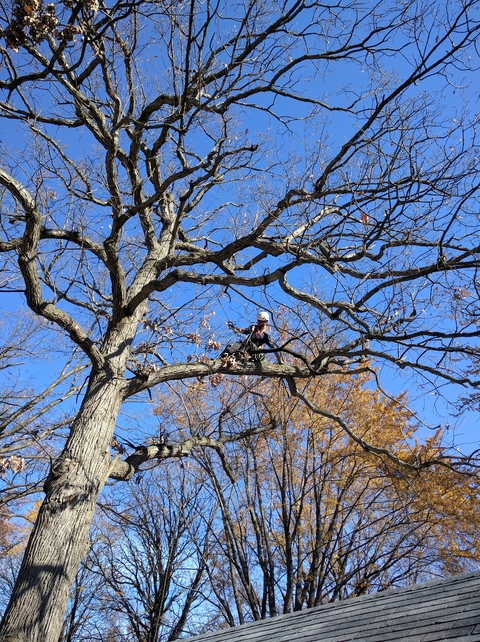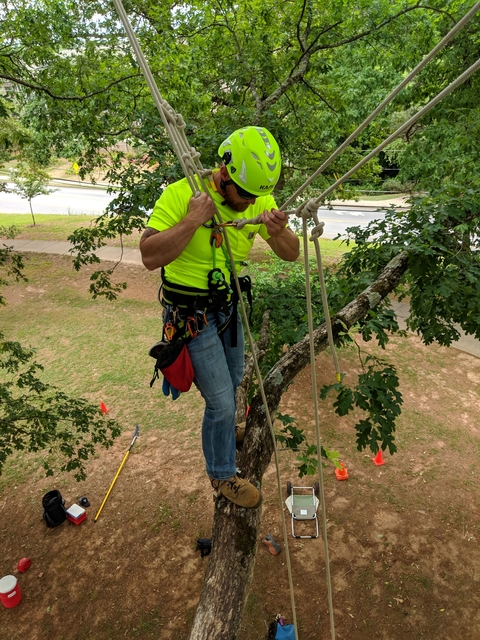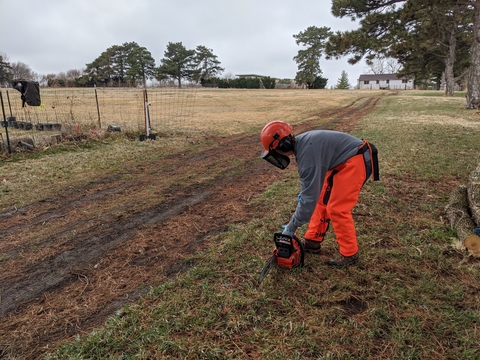Quick facts
- Tree care professionals, or arborists, are highly skilled and knowledgeable about tree care and pruning and can assess and diagnosis pest issues.
- An arborist should be certified through one or more professional organizations.
- A reputable professional arborist always wears personal protective equipment (PPE) and uses safety equipment.
- Not all tree care companies employ professional arborists. Always ask for credentials and proof of insurance.
Hiring an arborist is an important investment. It can be helpful for property owners to have some basic knowledge about certification, experience, training and expertise when making a choice about who to hire.
A healthy tree adds value to a property and improves the surrounding environment. It serves as habitat for important animals, birds and insects while enhancing the lives of people.
Professional arborists are trained to provide proper care and management and to help maintain healthy trees. Their expertise may include planting, transplanting, fertilizing, pruning and tree removal.
They are also skilled at diagnosing pest problems, removing infected parts of trees, and applying pesticides if necessary. An unhealthy tree or a tree in poor condition can become an eyesore and a hazard.
Where can I find a professional arborist and what qualifications should they have?
A professional arborist should be certified through one or more international, national or local organizations. The industry-standard certification is the ISA (International Society of Arboriculture).
Membership in these and other professional organizations does not guarantee the quality of work, but it does show professional commitment to education and best practices.
International Society of Arboriculture
An ISA Certified Arborist ®:
- Has passed an exam covering all aspects of tree care.
- Has a minimum of three years experience in some aspect of tree care or a college degree in horticulture, forestry, landscape architecture or urban forestry.
- An ISA Board Certified Master Arborist (BCMA) is the highest level of certification offered by the ISA.
American Society of Consulting Arborists (ASCA)
An ASCA member has a minimum of five years experience in arboriculture plus one of the following educational requirements:
- A four-year degree in arboriculture or a closely related field.
- Is a Board Certified Master Arborist certification or has a minimum of 240 approved CEUs.
- Members are required to earn 30 CEUs every two years to maintain ASCA membership.
Tree Care Industry Association (TCIA)
TCIA members own a commercial tree care business and carry General Liability and Workers' Compensation Insurance (if there are employees).
Most cities in Minnesota require arborists to be licensed by the respective city if the company wishes to perform tree work within the city limits. Many communities require tree care companies working on publicly owned trees to:
- Employ ISA Certified Arborists.
- Register with the community as a licensed tree care company.
The Minnesota Department of Agriculture Checklist for Hiring a Tree Care Company is a good resource for verifying the licensing requirements. Note that being licensed does not imply proficiency. In Minnesota, licensing only means that tree care companies have paid an annual licensing fee and have shown proof of insurance.
Consulting arborists
Consulting arborists are specially trained and experienced in the assessment and diagnosis of tree and shrub issues caused by insects and diseases as well as environmental conditions. They may be self-employed individuals or affiliated with a tree care company.
Many cities employ urban foresters or Minnesota Certified Tree Inspectors who typically work in the parks and recreation or public works departments. They may also help diagnose tree problems for citizens and offer advice on tree care and management. Contact your city to determine whether your city employs an urban forester or Minnesota Certified Tree Inspector.
Tree inspectors are certified by the Minnesota Department of Natural Resources (DNR ). They must pass an exam covering the inspection of trees and wood for disease and pests common in Minnesota.
Pesticide applications
A professional arborist that applies a pesticide to a tree for hire needs to be licensed by the state of Minnesota. They are required to have a category E, Turf and Ornamental license issued by the Minnesota Department of Agriculture (MDA).
All pesticides that can be applied to trees need to be registered by the Environmental Protection Agency (EPA) and with the state of Minnesota.
All applicators must follow the label and only apply the pesticide at sites and plants listed on the label. Only licensed applicators can use restricted-use pesticides.
CAUTION: Mention of a pesticide or use of a pesticide label is for educational purposes only. Always follow the pesticide label directions attached to the pesticide container you are using. Remember, the label is the law.
General guidelines for selecting a professional arborist
Ask about the tree care professional’s certification, background, and insurance.
- Ask about certification, education, and experience.
- Inquire about proper use of PPE and other safety equipment.
- Request local references and to see some of their work. Ask if they would hire this professional again.
- Request proof of insurance such as liability for personal and property damage as well as worker's compensation.
- Contact the insurance company to make sure the policy is current.
- Under some circumstances, you can be held financially responsible if an uninsured worker is hurt on your property or if the worker damages a neighbor's property.
Get it in writing. Be sure you clearly understand the work, total cost and terms.
- Request a specific contract for work that includes all tasks, costs, materials and labor associated with the work.
- The contract should include the responsibility for clean-up and disposal of branches, leaves, trunk and wood chips.
- It should also include any issues that apply to the timing of the work and the potential to contract or spread tree diseases or insect pest problems.
- A reasonable down payment may be expected if materials are part of the contracted work. Examples of these may include tree preservation, pesticides, fencing and signage, mulching, and transplanted or purchased trees.
- Terms for residential tree work are usually "due on delivery.” In some cases, terms may require payment before the work begins.
- Do not feel obligated to pay in full until the work is completed.
Take your time. Get two or more estimates if possible.
- Good tree work can be expensive. It pays to shop around. Rest assured you are making a wise investment that adds value to your property.
- Beware of estimates that fall well below other quotes. There may be hidden costs or the person may not be fully insured or certified. A good tree care professional will carry several kinds of insurance as well as pay for specialized equipment.
- Do not rush into a decision even though some contractors may offer a discount if you sign a contract immediately.
Trees are valuable to home landscapes and the surrounding environment. A good tree care professional can be a resource for you for years to come. They bring significant experience and understanding of how to care for trees and provide long-term value to you and your property as well as surrounding communities.
Reviewed in 2023




